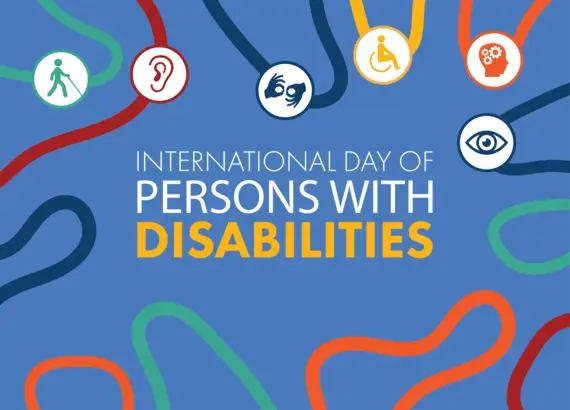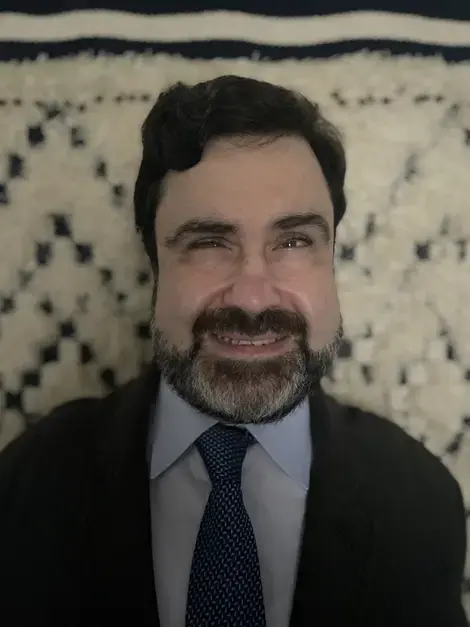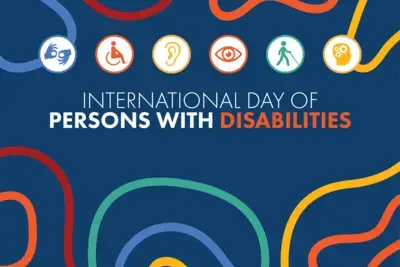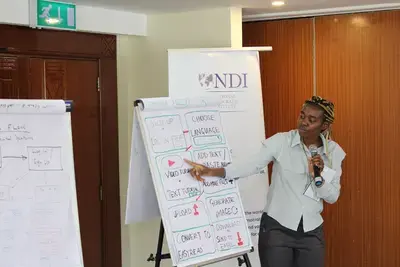
Success Story
Partner Profile: AFRPD
In recognition of the International Day of People with Disabilities, NDI is highlighting the essential work of partners who are at the forefront of fighting for greater levels of equality and organizing to shift social norms and perceptions and reduce barriers to political participation for persons with disabilities.
NDI interviewed the Arab Forum for the Rights of Persons with Disabilities (AFRPD), a local partner comprised of national organizations and networks representing individuals with diverse disabilities. AFRPD aims to strengthen the disability movement in the Arab region and advocate for the rights of people with disabilities as outlined in the UN Convention on the Rights of Persons with Disabilities (CRPD). Co-founder Mohammed Ali Loutfy explained how AFRPD is working to facilitate inclusive political participation and amplify the leadership of persons with disabilities across the Arab region.

NDI sat down with AFRPD co-founder Mohammed Ali Loutfy to learn more about what disability leadership means to him.
What does disability leadership mean to you/your organization?
Leadership means that persons with disabilities are the ones who represent themselves. It’s not acceptable for other people working in the field of disability services, particularly segregating institutions, to claim that they represent persons with disabilities. Disability leadership also means that people with disabilities are involved in decision-making processes through dialogue, monitoring, and implementation.
Disability leadership should be performed through an organization of people with disabilities (OPD/DPO), as defined by the UN CRPD (Convention on the Rights of Persons with Disabilities). Within the disability rights movement, there has been a longstanding debate to distinguish between organizations of people with disabilities and organizations for people with disabilities. Organizations for people with disabilities typically provide services, while organizations of people with disabilities are led and run by people with disabilities. In order to qualify as an organization of people with disabilities, people with disabilities must constitute a majority of the board of directors and members. People with disabilities should be in leadership roles and should be responsible for making decisions on behalf of the organization and ensuring its sustainability.
Participation in decision making is also key. For example, people with disabilities must be involved in decisions about disability rights issues or other issues that might impact them. When we talk about disability leadership, we are talking about empowerment, capacity building, training, and awareness raising for people with disabilities.
How is AFRPD working to amplify the leadership of persons with disabilities to achieve a more equitable and inclusive future?
AFRPD was formed to represent grassroots organizations of people with disabilities. Although there are other platforms in the Arab region claiming to represent people with disabilities, many of these are influenced by the government, which means their funding sources, programs, and activities are not independent. At the time of AFRPD’s establishment, it was challenging to find people with disabilities who had formed their own independent organizations. In order to uphold AFRPD’s grassroots identity, however, we aim to ensure that all of our member organizations are independent.
All of AFRPD’s board members are people with diverse disabilities. We have one board member who is Deaf, two who are blind, and four members with physical disabilities. We ensure that they are directly involved in all AFRPD activities and that they benefit from capacity building and empowerment opportunities. Additionally, all of AFRPD’s activities are conducted by people with disabilities and their representative organizations. Our members engage in data collection and research in support of AFRPD’s mission to promote and monitor implementation of the CPRD in the region.
Our partnership with NDI has enabled us to expand opportunities for people with disabilities in Lebanon, Libya, Morocco and Tunisia to participate in this project. This means that our activities are not only intended for our country representatives, all of whom are persons with disabilities, but are designed to reach and engage a larger number of persons with disabilities in each country. We also seek to ensure that people with disabilities are authentically represented in decision-making spaces by organizing delegations to enable AFRPD members to participate in key international conferences and events.
How can the disability movement diversify its leadership to ensure equal representation of women and girls with disabilities, persons with albinism, persons who are Deaf, and persons with psychosocial and intellectual disabilities?
The main barrier to ensuring inclusion and involvement of women and girls with disabilities in leadership is local cultures. Women and girls are limited by the extent to which their families allow them to be involved in their community and be exposed to and connected with DPOs. Therefore, raising awareness among local communities is a key requirement for shifting social norms and diversifying leadership within the disability movement.
Another factor which is very important is ensuring accessibility. In many countries in the Arab region, accessibility is not taken seriously and the understanding of accessibility is very narrow. For example, accessibility is often understood as improving access to services, but nothing beyond that. When we talk about accessibility, however, we need to have a more holistic approach. This means ensuring that people who are Deaf have access to quality sign language interpretation, as well as ensuring that printed and online communications comply with accessibility standards.
People with intellectual and psychosocial disabilities are often the most marginalized within the disability movement due to the belief that they have to be represented by their families. While family members can support people with intellectual and psychosocial disabilities to be involved in public life, they should not be allowed to speak on their behalf. Capacity building and empowerment programs must be designed to respond to the specific needs and requirements of people with intellectual and psychosocial disabilities. This is a major challenge in the Arab region because unfortunately spending on accessibility by national governments and local organizations is limited and international accessibility standards are not followed. Therefore, we need to raise awareness among governments and organizations about the accessibility standards outlined in the CRPD and how to comply with these.
In the past year, can you briefly share a success from your organization’s contribution to strengthening the disability movement?
AFRPD has been working with NDI to promote the participation of persons with disabilities in political life. Through this project, we have trained people with disabilities on communication skills and have helped them to strategically engage with policymakers in their countries. We have succeeded in engaging persons with disabilities in Libya, Lebanon, Tunisia, and Morocco to connect with policymakers. Within each country, each group we engage focuses on a different issue area related to political participation, such as engaging with political parties and parliamentarians. AFRPD is also planning to hold a regional conference in 2025 to bring together people with disabilities and policymakers in order to explore avenues for their continued collaboration.
What impact has NDI’s partnership had on your organization?
From an organizational point of view, NDI has helped AFRPD to grow. We have worked with NDI on organizational development activities and NDI has helped us to develop our three-year strategic plan with the support of a consultant. This has pushed AFRPD to think and act more strategically and has helped our organization to access potential funding resources, which has contributed to enhancing the AFRPD’s sustainability and leadership capacity.
We appreciate NDI’s strong commitment to promoting disability rights and see this evidenced by the projects we are jointly implementing and the level of support NDI has invested in these projects. For example, NDI has connected us with experts in the fields of communication, strategic planning, and advocacy. AFRPD has also had the opportunity to connect with DPOs in other countries in which NDI works. These opportunities for knowledge sharing and exchange are very important for us to leverage and can help us improve our leadership within the disability movement.


